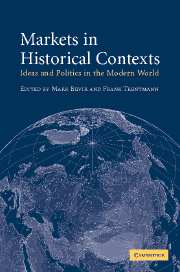Book contents
- Frontmatter
- Contents
- Acknowledgements
- List of contributors
- 1 Markets in historical contexts: ideas, practices and governance
- 2 Improving justice: communities of norms in the Great Transformation
- 3 The politics of political economy in France from Rousseau to Constant
- 4 Tories and markets: Britain 1800–1850
- 5 Guild theory and guild organization in France and Germany during the nineteenth century
- 6 Thinking green, nineteenth-century style: John Stuart Mill and John Ruskin
- 7 Tönnies on ‘community’ and ‘civil society’: clarifying some cross-currents in post-Marxian political thought
- 8 German historicism, progressive social thought, and the interventionist state in the United States since the 1880s
- 9 Civilizing markets: traditions of consumer politics in twentieth-century Britain, Japan and the United States
- 10 The ideologically embedded market: political legitimation and economic reform in India
- 11 The locational and institutional embeddedness of electronic markets: the case of the global capital markets
- Index
4 - Tories and markets: Britain 1800–1850
Published online by Cambridge University Press: 22 July 2009
- Frontmatter
- Contents
- Acknowledgements
- List of contributors
- 1 Markets in historical contexts: ideas, practices and governance
- 2 Improving justice: communities of norms in the Great Transformation
- 3 The politics of political economy in France from Rousseau to Constant
- 4 Tories and markets: Britain 1800–1850
- 5 Guild theory and guild organization in France and Germany during the nineteenth century
- 6 Thinking green, nineteenth-century style: John Stuart Mill and John Ruskin
- 7 Tönnies on ‘community’ and ‘civil society’: clarifying some cross-currents in post-Marxian political thought
- 8 German historicism, progressive social thought, and the interventionist state in the United States since the 1880s
- 9 Civilizing markets: traditions of consumer politics in twentieth-century Britain, Japan and the United States
- 10 The ideologically embedded market: political legitimation and economic reform in India
- 11 The locational and institutional embeddedness of electronic markets: the case of the global capital markets
- Index
Summary
One of the peculiarities of the British political tradition was the Conservatives' emergence as the party of the market and, more ambivalently, the party of free trade. Like much in the British political tradition, the origins both of Conservatism and the Conservative Party are deep, ambiguous and contested. The modalities of the constitutional crises of the 1680s and 1690s gave birth to a fiercely bi-polar politics, whose convulsions were only stilled by the political improvisations of Sir Robert Walpole who, after 1720, imposed a powerful and persistent Whig ascendancy. What emerged was a political culture quite different from that anywhere else in Europe. This was a political culture in which a still predominantly landed polity embraced mercantile and commercial dynamism, and thereby created the political and cultural preconditions for prodigious economic growth. The confidence, and the first British Empire, on which this prosperity was predicated might have been decisively punctured by the trauma of defeat in the American War of Independence. In the event, though, Britain's trading and manufacturing ascendancy proved reliant, and between 1783 and 1789 its young Prime Minister, William Pitt, embarked on a bold reconstructing of Britain's fiscal system designed to enhance its economic position. The American War, the French Revolution and Pittite politics conspired to transform the British political system, and from this crucible new party alignments and new party ideologies were forged. This too was a complex and ambiguous process.
- Type
- Chapter
- Information
- Markets in Historical ContextsIdeas and Politics in the Modern World, pp. 70 - 89Publisher: Cambridge University PressPrint publication year: 2004
- 2
- Cited by



